The insurgent accounts of witness
Jan Romanczyk "Łata" (= a patch) - the boy from "Miotła" (= a broom)
The first years of "freedom"
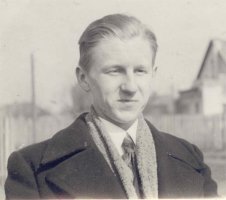 |
Jan Romanczyk
born on the 1st of May 1924 in Wolomin
sergeant cadet of Home Army
pseud. "Łukasz Łata" (= Lucas the Patch)
Kedyw of the Main Headquarters of Home Army
"Torpeda" (= a torpedo) Platoon, "Miotła" (= a broom) Battalion
"Radoslav" Grouping
|
After the end of the Uprising many friends got back to the field for further fight, some of them were captured, and lots of them would never come back again. This way we stayed alive till the liberation from the Nazi occupation. When the "liberation army" came we saw on the walls posters of the following content: "A bandit under the banner of AK," "AK a wretched moral midget of the reaction." The arrests ensued. For AK-men there was established a camp in Rembertow, from where Polish patriots were transported to Siberia.
When Soviet soldiers entered on the 17th of January 1945 Second Lieutenant "Torpeda" organized a transport of guns hidden after the Uprising for the area of our activity. Strange things were happening. 18th January, a heroic commanding officer of our platoon Second Lieutenant Kazimierz Jackowski pseud. "Torpeda" was shot in his own house. Having learnt about it I decided to hide thinking it was an attack on the Soviet part. From "Torpeda"'s family I heard nevertheless that he had been liquidated for the supposed cooperation with Germans. According to me it was an absurd accusation. That man carried out a sentence on several dozen secret agents and for his valour in the Warsaw Uprising he was decorated with the V-Class Order of Military Virtue. I didn't understand fully what had happened, but it came to my mind it had been a kind of an unclear affair. "Torpeda" was buried on the cementary in Golabki. At the end of the sixties and the beginning of the seventies when the plot had been reconstructed on the Soldierly Cementary on Powazki he was exhumed and buried in the plot "Miotła."
After about three weeks of Second Lieutenant "Torpeda"'s death I was accosted by one of new "Torpeda"'s people and asked whether he had the pleasure of meeting friend "Łata." When I confirmed it he said that when "Torpeda" had been suspended he had ordered him to report himself together with his people to me. I knew that man but I didn't know he'd had any contacts with "Torpeda." I arranged a meeting with him later while me myself I got in touch with "Anatol" and reported that "Torpeda"s unit reported to me. I was ordered to receive the unit and to wait for further orders. The unit soldiers reported under my leadership. In the ensuing situation we continued the underground activity.
In Ursus Mechanical Plants there was located Polish Independent Motor Battalion. The commanding officer of that unit was a Russian, who had received lodgings at my friend's. I knew him personally. He talked about himself very willingly. In the Soviet Army he was a sergeant and took part in Leningrad defence. His story made one feel that he was a decent man. He gave orders of departure to boys and made the transport of flour to Warsaw from Zamosc possible. Spending time with me he realized who he dealt with. He turned to me I should run away as those rascals wouldn't let me live. I was explaining to him I had friends who had to be buried with dignity, as they sacrificed their lives for the Mother Land. He said that he wished me I could succeed.
For transporting flour he was arrested and did time at Rakowiecka Street. In July 1945 he went out of the prison and came to me. He got a two-week pass and he wanted to go to the West Lands. He asked me whether he could visit me when coming back. I agreed. He came with a friend. I helped him sell trinkets he had brought as he knew he wouldn't manage to take anything with himself. He said they would be transported behind Ural to the sovkhoz and they wouldn't be allowed to talk about this they'd seen and heard and all the more to contact with anyone from abroad. They departed with tears in their eyes.
One of the significant issues that we had started realizing was the exhumation of the fallen friends. We did it in secret till the moment of revealing the Central Area of AK. From the command I got an order of securing people fro exhuming the bodies of friends fallen in the Warsaw Uprising. The exhumation of friends we did out of temporary graves located on the lawns while in some cases of places where they had been killed and there was no possibility of burying them. The exhumation was always accompanied by the Red Cross representative, there was always the Earl's Daughter Anna Pia-Mycielska with us.
In the meantime I got an order of carrying out a military action in Komorow. We had some new people, but I don't remember whether there was four or five of us. We were on the right place, but the action didn't happen as it hadn't been well-organized. The second part of the group didn't appear. We were getting back through Paszkow with the intention of shooting the guns transported from Warsaw. Having fired some shots and examining the guns suddenly from behind the bushes a Soviet soldier came out with a Russian automatic pistol. He yelled: "Ruki w wierch" having us in his sights. When he took the gun from us we started explaining that there were the Citizen's Militia and we showed a phoney certificate.
The Soviet said he didn't understand Polish and we had to go with him to the station. There was a little Jew that could translate everything. Under no circumstances were we excited about it. The situation got complicated. The soldier noticed a white sheet of paper on the tree at which we'd been shooting and came close to it to remove it. When he turned back he saw a gun aimed at his direction. He didn't react to the call: "Ruki w wierch" and surprised he reached for the gun. A shot was fired from our side. The rebound bullet hit him in the head so powerfully that he staggered. Friends threw themselves at him and overpowered him.
I came close to him and said that I'd give a gun back to him but the ammunition I would scatter so that he couldn't shoot. He didn't want to agree to that. He repeated all the time he had to escort us to the unit what amounted to our death sentence. I didn't have any choice. I reached for "Blyskawica" and fired a burst of shots in his direction. I felt sorry for him but even more sorry I felt for my friends and for me myself. I had undergone so much in the Warsaw Uprising and now I would lay down my life in such a silly way? We left the place of the event taking additionally the Russian automatic pistol and two magazines of ammunition. The incident I reported to my commanding officer Leszek Nizynski.
Soon after those events Leszek Nizynski held a meeting, where Andrzej Sowinski pseud. "Zagloba" from "Zoska" was present and announced that my commanding officer would be "Zagloba" from the time on. My first action was to be an assassination of Colonel Grosz of People's Army of Poland. When I was prepared for the action it was called off. Then I got an order of getting guns from officers and soldiers both Polish and Russian ones. That kind of job didn't meet my expectations. Justifying my decision with a will to go to another city I asked for an exemption which I was given. Antony Olszewski pseud. "Wilk"(= a wolf) that I contacted with "Zagloba" was my deputy.
In the meantime we carried out the exhumation all the time. He who led the exhumations in the name of Colonel "Radoslaw" was Lieutenant Tadeusz Janicki pseud. "Czarny" (= black). From some time we'd been doing that apparently legally. I took part in the exhumations to August then a break ensued. Colonel "Radoslaw" was arrested. At the beginning of September the Action of Disclosure was announced. I came out on the 17th of September 1945.The exhumation started on new conditions negotiated by Colonel "Radoslaw." Now exhumations were carried out openly and fast.
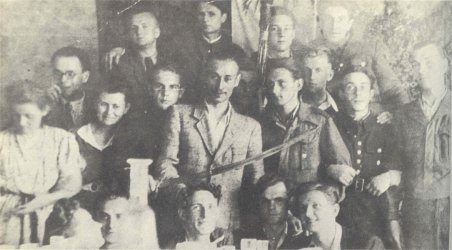
The group of soldiers from "Miotła" 1946
Third on the right Jan Romanczyk is standing
From the moment of disclosure the "Miotła" milieu had started existing. We worked on preserving the memory of our friends and Home Army Ethos. As a result of those actions there was opened a cemetery of the Warsaw Insurgents, a built and blessed statute commemorating Home Army Fallen Soldiers 1939-1944 "Gloria Victis" on Soldierly Powazki Cemetery. The main initiator of those works was Colonel/General Jan Mazurkiewicz "Radoslaw". The milieus received from Colonel "Radoslaw" money for organizing the manufacturing workshops, gainful to support the young in obtaining the education.
A solemn blessing and opening of the statue took place on the 1st of August 1946.It was a great manifestation of Warsaw citizens in honour of Home Army Soldiers.
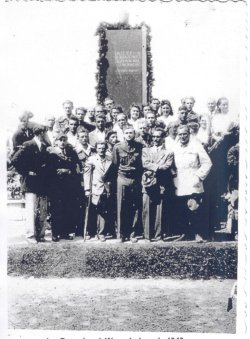
The opening of the statue Gloria Victis 1946
Third on the right Jan Romanczyk is standing
At the same time it was the beginning of the contemporary authority discontent that decided to cross off Home Army from the history of Poland. The repressions started. At the end of 1948 the arrests started of the most active former Home Army soldiers under the pretext of joining the underground movement. Essentially the arrested where accused of glorifying Home Army. Severe sentences were passed, one didn't even hesitate to announce death sentences.
Demonstrating the patriotism adoring ideals and a will to study, as the majority had taken up studies, didn't please the contemporary regime. They realized that in such a situation they could lose their power and they started looking for a pretext of obviating "the unavoidable defeat."
My experience was similar to many other Home Army soldiers. I started studies in Warsaw. In the section of the Academic Association of War Veterans of the Republic of Poland I made friends with Zofia Babulewicz. She was the Home Army soldier as well with the pseudonym "Bisia". When the Warsaw Uprising broke up she was fighting in the insurgent units in Praga. Then she got across Vistula and on the 16th of August 1944 she fought in "Kampinos" grouping. During the time when Kampinos units were forcing their way she was seriously hurt near Jaktorow. She was cured in the hospital in Zyrardow. At Christmas 1947 our wedding took place.
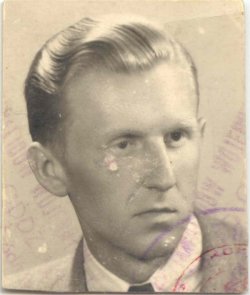
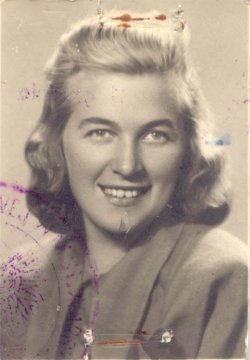
Jan Romanczyk 1947 r. Zofia Babulewicz ps. "Bisia"
Then I went to Cracow. Continuing the family tradition I took up the studies in the Academy of Mining and Smelting Engineering on the smelting department- the founding section. I was put up in the dormitory of war veterans. On the 1st of December 1948 as a second-year student of the Academy I took up a job in the Central Institute of Metallurgy and Founding in Borek Falecki. I thought that after cruel years of occupation I could start a new life.
Jan Romańczyk
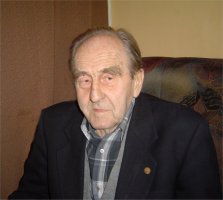
|
Jan Romanczyk
born on the 1st of May 1924 in Wolomin
sergeant cadet of Home Army
pseud. "Łukasz Łata"
Kedyw of the Main Headquarters of Home Army
"Torpeda" Platoon,
"Miotła" Battalion
"Radoslaw" Grouping
|
elaboration: Maciej Janaszek-Seydlitz
translation: Małgorzata Szyszkowska
Copyright © 2011 Maciej Janaszek-Seydlitz. All rights reserved.





